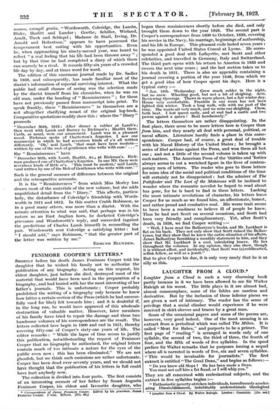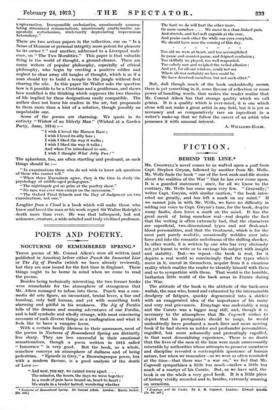LAUGHTER FROM A CLOUD.* Laughter from a Cloud is such
a very charming book partly because in it we have been allowed to see Sir Walter Raleigh at his worst. The little plays in it are almost bad, almost commonplace, some of the fables are careless and derivative. But by the inclusion of these inferior pieces we are given a sort of intimacy. The reader has the sense of privilege that a social climber would experience if he were received in shirt-sleeves and braces by a great man.
Some of the occasional papers and some of the poems are, however, very good indeed. One of the most amusing is an extract from a periodical which was called The Milan. It is called "Meat for Babes," and purports to be a primer. The first page of " reading " is arranged in words only of one syllable, the second of two, the third of three, the fourth of four, and the fifth of words of five syllables. In the spoof preface Sir Walter remarks that he purposes issuing a sequel where all is narrated in words of five, six and seven syllables. " This would be invaluable for journalists." The first extract is entitled " The Good Dean," and begins as follows :— " Do you know old Slops ? He has been made a Dean.
You must not call him a fat fraud, or I will whip you."
They are all concerned with ecclesiastical subjects, and the extract in five syllables begins :—
" Enthusiastic poverty-stricken individuals, tumultuously acceler- ating Disestablishment, indubitably underestimate theological • Laughter from a Cloud. By Walter Raleigh. London : Constable. [21s. net.]
tssrgiversation. Irresponsible ecclesiastics, unanimously accumu- lating simoniacal remunerations, unanimously anathematize un- apostolic sectarianism, irrelevantly depreciating impecunious heterodoxy."
There are two serious papers in the collection, one on " Is a Sense of Humour or personal integrity more potent for pleasure to its owner ? " and another, addressed to a Liverpool audi- ence, on " The Two Moralities." This paper is that valuable thing in the world of thought, a ground-clearer. There are many writers of popular philosophy, especially of ethical philosophy, who begin by erecting a positive edifice and neglect to clear away old tangles of thought, which is as if a man should try to build a temple in the jungle without first clearing the site. In this paper Sir Walter asks the question how is it possible to be a Christian and a gentleman, and shows how muddled is the thinking which supposes the two theories of life implied by these designations easily compatible. The author does not leave his readers in the air, but propounds to them more than a hint of a solution, though possibly an unpalatable one.
Some of the poems are charming. We quote in its entirety " Wishes' of an Elderly Man" (Wished at a Garden Party, June, 1914) :- " I wish I loved the Human Race ;
I wish I loved its silly face ;
I wish I liked the way it walks ; I wish I liked the way it talks ;
And when I'm introduced to one, I wish I thought What Jolly Fun I "
The aphorisms, too, are often startling and profound, as such things should be :—
" In examinations those who do not wish to know ask questions of those who cannot tell."
" When three Examiners agree, then is the time to study the psychology of middle-aged pedagogues."
"The nightingale got no prize at the poultry show."
"No race was ever won except on the racecourse."
"The Oxford Final Schools and the Day of Judgment are two examinations, not one."
Laughter from a Cloud is a book which will make those who knew and loved the man or his work regret Sir Walter Raleigh's,
death more than ever. He was that infrequent, but not unknown, creature, a wide-minded and truly civilized professor.











































 Previous page
Previous page